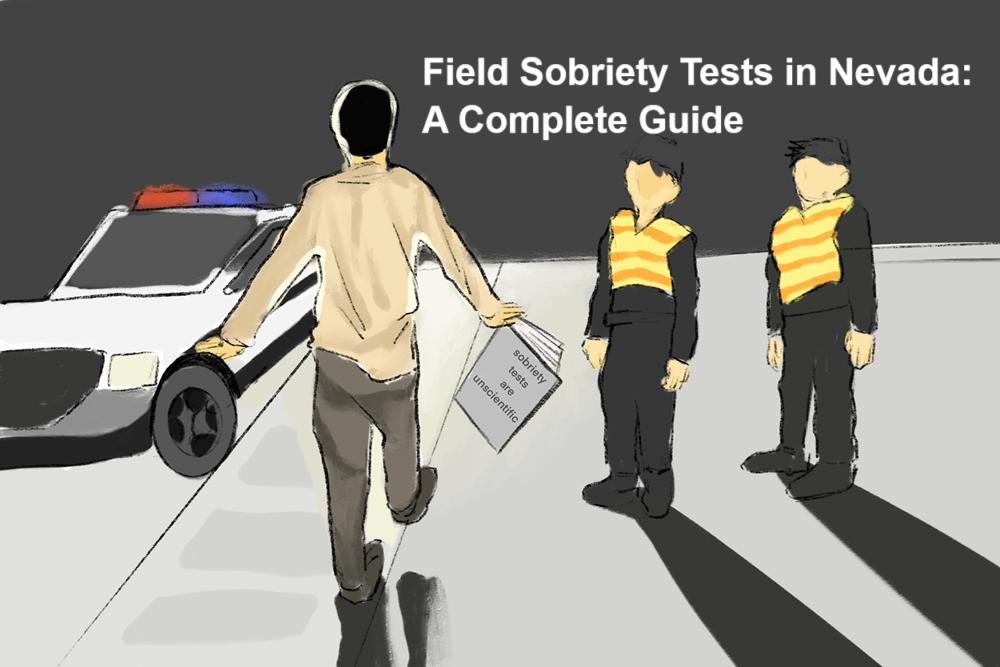If you are pulled over because police suspect you are driving under the influence (DUI) of alcohol, you may be asked to complete a series of field sobriety tests (FSTs). While FSTs are meant to help law enforcement determine if you are intoxicated, multiple variables and external factors can affect your results.
Our experienced Las Vegas DUI lawyers share everything you need to know about Nevada field sobriety tests, including what you can expect and how to fight a DUI charge based on unfair FST outcomes.
What Is a Field Sobriety Test?
A field sobriety test is used by law enforcement to identify suspected drunk drivers. When there is probable cause to pull someone over for DUI, the police officer may ask the driver to step out of the car and submit to field sobriety testing.
The driver completes tasks that require balance, coordination, and listening skills. These field sobriety tests are meant to measure certain reflexes and responses that are often compromised when a person is intoxicated. Based on how the driver completes these tasks, the police may observe indicators of alcohol impairment.
Types of Field Sobriety Tests in Nevada
The National Highway Traffic Safety Administration (NHTSA) has approved three field sobriety tests that officers can use to identify impaired drivers. Known as standardized field sobriety tests, law enforcement is trained to administer these three FSTs.
Horizontal Gaze Nystagmus Test
The Horizontal Gaze Nystagmus (HGN) test measures involuntary jerking eye movements connected to alcohol intoxication. During the test, the officer will ask the driver to keep their eyes fixed on an object, typically a penlight. As the object slowly moves from side to side, they want to see that you can follow it with your eyes.
During the test, the officer will add up how many times the pupils appear to bounce or jerk. The “clues” they look for include:
- Lack of smooth pursuit: This happens when the eyes cannot track a moving object smoothly. An impaired person’s eyes may appear to jerk as they follow a stimulus. If this happens, the officer will consider it a clue.
- Nystagmus at maximum deviation: The officer will hold the object at a 45-degree angle or maximum deviation from the eyes for four seconds. If the eyes appear to bounce or jerk toward the side, it is counted as a clue.
- Onset of nystagmus prior to 45 degrees: If an officer observes that a driver’s eyes begin jerking before reaching maximum deviation, it is another clue that is counted during the test.
According to NHTSA standards, the maximum number of possible clues for each eye is three, making the total maximum for both eyes six clues. If the officer observes four out of the possible six clues during this field sobriety test, it indicates a blood alcohol concentration (BAC) above the legal limit of 0.08.
Walk and Turn Test
The Walk-and-Turn (WAT) test is a divided attention test that includes a mental and physical task. First, the officer gives verbal instructions and demonstrates what the driver must do, including nine heel-to-toe steps in a straight line, turning, and repeating. Drivers are also instructed to count aloud and watch their feet during this field sobriety test.
Law enforcement is trained to look for the following clues during a WAT field sobriety test:
- Not maintaining a heel-to-toe position while listening to instructions
- Starting too soon after being told to wait until the officer says to begin
- Stops walking during the test
- Not touching their heels to toes as instructed
- Stepping off the line they are following
- Raising arms more than six inches from their side to maintain balance
- Failing to complete a proper turn
- Doing an incorrect number of steps
If the officer observes more than two clues during a WAT test, it tells them the driver may have a BAC at or above 0.08.
One-Leg Stand Test
During a One-Leg Stand (OLS) test, the police officer gives detailed instructions for the subject to raise either leg about six inches off the ground while keeping the foot parallel to the ground. Both legs should be straight, with arms at their sides and eyes on the raised foot. While holding this position, the subject must count aloud until told to stop.
There is a maximum of four clues for an OLS test. Police will look for these clues that may indicate alcohol impairment:
- Swaying while trying to balance
- Using arms to balance by raising them six or more inches from their sides
- Hopping to maintain balance
- Putting their foot down during the test
Observing two or more OLS test clues will signal to the officer that the driver is likely over the 0.08 BAC limit.
Do I Have to Take a Field Sobriety Test When Pulled Over for DUI?
No, field sobriety tests are not a requirement if you are pulled over for a suspected DUI. You can choose to respectfully decline optional field sobriety testing in Nevada. However, there may be consequences, including:
- Police using your refusal as probable cause for arrest
- Requiring evidentiary testing, such as breath or blood tests
- Possible time in jail or a police station while tests are conducted
RELATED: Lack of Probable Cause Examples for a DUI Stop or Arrest
What Can Cause False Positives in a Field Sobriety Test?
Field sobriety tests are incredibly subjective and have low accuracy rates. Because there are so many factors that can affect the outcome of these tests, it is crucial to understand that FSTs are unreliable and do not confirm guilt. Here are conditions that could impact FST results:
External Testing Conditions
- Extreme weather conditions
- Uneven or slippery surfaces
- Poor lighting or visibility
- A loud environment
Medical Conditions
- Vertigo or inner ear issues
- Neurological disorders
- Diabetes
- Hearing Impairments
- Physical limitations
- Clinical anxiety
- Medication side effects
Officer Error
- Improper FST instructions
- Biased result interpretations
- Failing to consider physical disabilities
Can a DUI Attorney Fight Field Sobriety Test Results?
Field sobriety tests are not scientifically valid, and a lot can happen while the tests are administered. This means a skilled DUI attorney can challenge the results. Simple questions may create a reasonable doubt of intoxication, including:
- Were the proper directions explained for each test?
- Were the nationally standardized tests administered properly?
- Did the subject truly fail the tests?
- Did the subject actually exhibit signs of impairment?
- What were the conditions in which the test was administered?
Speak With a Skilled DUI Lawyer in Las Vegas
If you were charged with DUI in Las Vegas after failing field sobriety testing, our trusted attorneys can help. At DUI Lawyers of Las Vegas, our highly trained team understands the laws and science behind field sobriety tests and knows what steps to take to protect your rights. Contact us to schedule a free consultation today.

